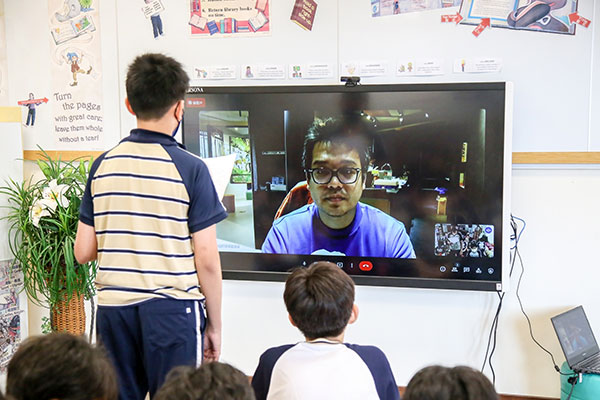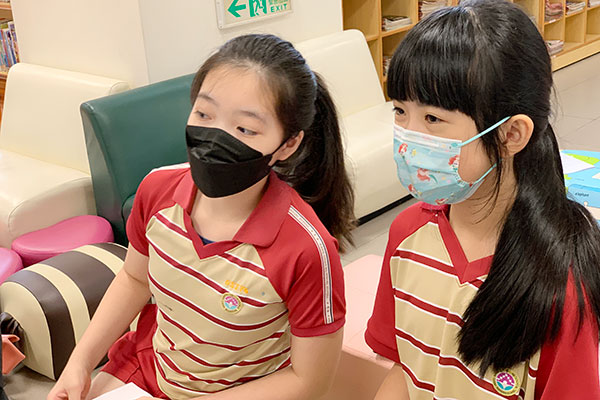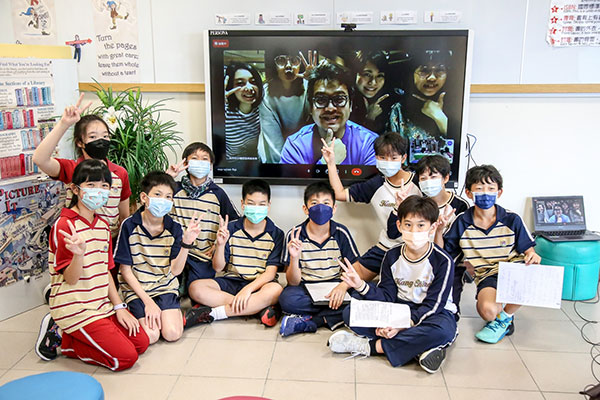Google Meet Meeting On-line
Reflection of the second interview (visiting X5 Charity Foundation)
References
Google Meet Meeting Online
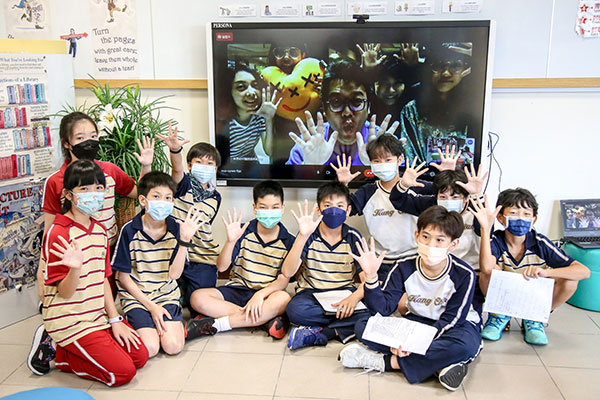
◆ Interview Information (Q&A Transcript)
Student: Hello Dr. Tzu-Hung Lin, we are fifth and six grade students from Kang Chiao, and I am Alvin from sixth grade. We want to thank you unconditionally for letting us interview you.
Dr. Lin: Hello Alvin, hello everyone.
Student: Thank you for saving a time for us to meet. In a moment, we will interview you one by one, in order to learn more about you and your foundation.
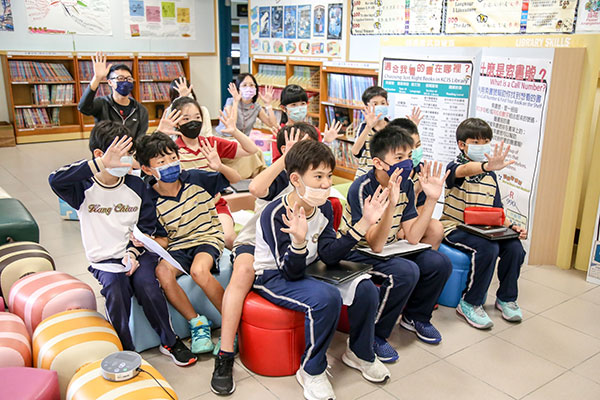
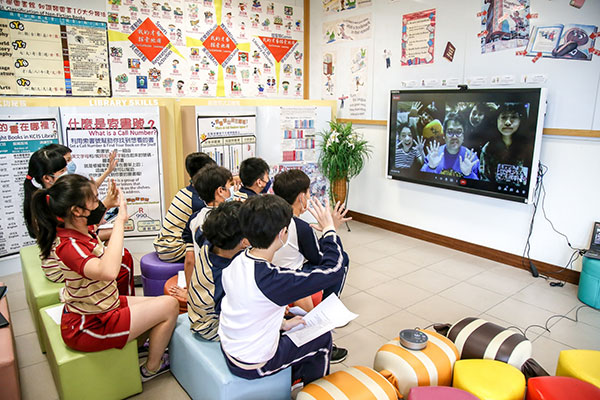
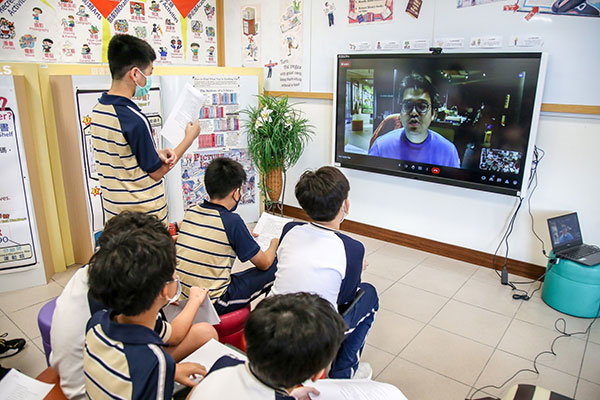
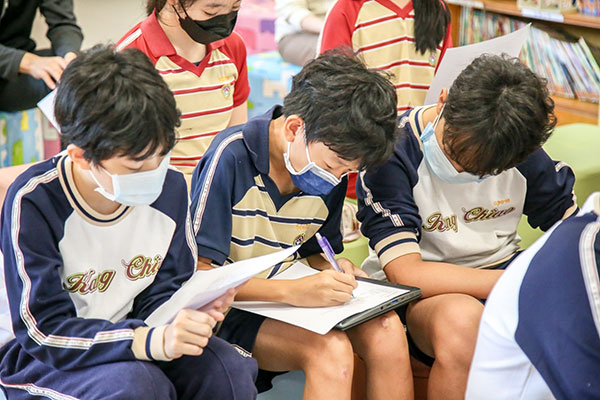
Q1: Is there a special meaning behind the name of the foundation, “X5 Charity Foundation”, and the 5 Xes on the foundation logo? (Alvin Lee)
Dr. Lin: The foundation’s name is X5 because I look like Chen Wu Jing, don’t you agree? Ha! Do you know who Chen Wu Jing is?
Student: Yes, I’ve heard of him before!
Dr. Lin: Maybe! No, when I was at your age, about 18~20, I was also handsome, but I am fat now, haha. You all may not know who Chen Wu Jing is. I will turn my video closer, and let you see my handsome face. Ha! You guys are laughing happily, yeah, now I am fatter.
Regarding our foundation, you have heard about it before: we are helping children and pregnant women. When you see “Lin Tzu-Hong,” these three words, you may think this is strange, but when you see “X5 Foundation,” you will think it’s interesting and will be curious that this is called “Chen Wu,” or X5. Then you will be keen to know what this foundation is doing, and might be interested in this foundation. So we decided to use “X5 Foundation” as its name, with the logo as a heart with five X’s, so you can call it Cha Wu or Chen Wu Foundation, and you can read it more conveniently. It’s a more interesting name than “The Lin Tzu-Hung Foundation.”
Q2: What’s the budget of the Dreams-Come-True Program? (Howard Luo)
In our “Dream Come True” plan and project, our goal is to mainly help children who are in remote areas, or who are underprivileged. We do this because their resources are not enough. Then, we think that all children are very talented and capable of development, but they should not be affected by the lack of resources. Our foundation’s current “Dream Come True” plan will help a single case for a year. We hope that it will fall between roughly NT$5,000 and NT$50,000 a month. Most of the children accept tutors and take music lessons. It's about one class per week, and one month’s budget is about NT$5,000, so it should be enough. So we hope to help the children realize their dreams with a budget of about NT$50,000 for a one-year plan at a time.
Q3: How do you decide who to help? (Howard Luo)
Basically, the people who receive help from our foundation are usually chosen from the student’s own application, or the student’s elementary school teacher’s application, because the teachers actually know the situation of every family in each case. That’s because I can not get in touch with all of them directly. So through the teacher’s help and understanding of these children, I will think that this kid has the potential and wants to learn, but he does not have enough resources. Then the teacher will contact our foundation, and there will be social workers who assess the family conditions and learning abilities of these children, and provide them with appropriate resource assistance.
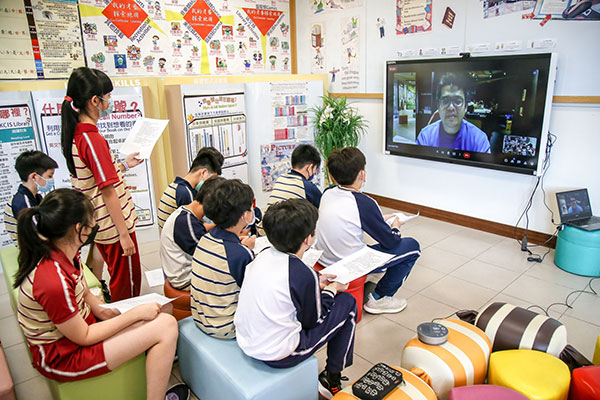
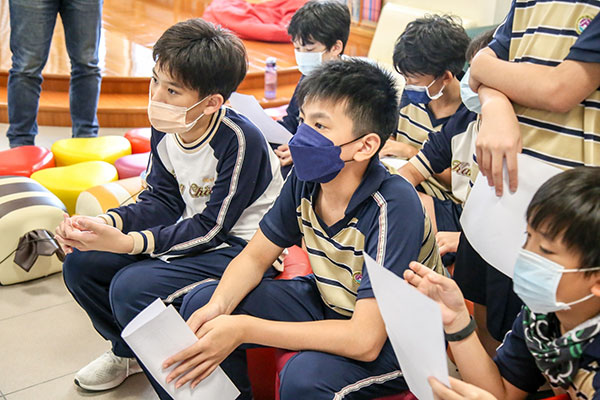
Q4: How do you decide what kinds of donations to ask for? (Charles Lu)
We have two options: one is a charity project, which will be used mainly for kids that live in suburban places. We will implement this project at some Hualien after-school programs; for example when you finish your classes, will you go back home around 3 or 4 o’clock? Or do you have to go to after-school classes? Yes, some of you have to go to after-school programs, but because Kang Chiao is a privately-owned school, the school can help with them. But because suburban or government-owned schools don’t have as many things provided to them, maybe at that time moms and dads still have to work, and their children will need to wait to be picked up. So for this period of time, some people in those suburbs will open after-school programs, and those after-school programs will prevent children from playing on the streets or wandering alone. So parents will send their children to those programs. But, different after-school programs need to use different types of resources: some of them want to have musical instruments, and some of them want to have dinners, to let children eat more healthily. So with different types of requests, we will try our hardest to help.
We will also help hospitals. When children have health problems, they will go to the hospital, and those hospitals need to use medical devices. Many of those devices they need have to be applied, either from their board or from the government. But when they finish applying, they may find out there are still many more things that they don’t have. One simple example is our hospital will care for children that have heart problems, and they may need a cardiac catheter, which could cost over NT$10,000,000. Our hospital will have extra money to help buy that tool. But when the cardiac catheterization procedure is performed, you need to find the blood vessels. When you get a shot, you will get it on your arm? Yes, you will get the shot on your arm, but you are more than 10 kg. But if it is a baby, they are only 2-3 kg, and their blood vessels are very thin, so the doctors can’t see the blood vessels. So they need an ultrasound machine to find the blood vessels, but if they didn’t apply to buy that machine, they need to apply again. But when they apply for it, it takes time, and that time can also cause a problem. Our charity will help these hospitals to buy these machines more quickly, so when these babies are brought for treatment, doctors can find the blood vessels easily so that the blood vessels won’t get ruptured. When hospitals make a request like this, we will contact the manufacturers and do our best to deliver to the hospitals.
So in general, we will help these schools, groups and hospitals, and they will make requests for the things that they want, and we will see if this request is vital or necessary. However we can help, we will help them as best as we can.
Q5: Aside from Dr. Lin Tzu-Hung, are there other people supporting the foundation? (Charles Lu)
Our charity’s money mostly comes from nice people, like your teachers, who donate to us. People who donate are all helping the charity. If one person is kind, it helps. But if there is a group of them, it will be even more useful. If we want one person to donate something that costs NT$100,000, it is a large pressure on everyone. But if there are many people, everyone can donate a little, and we gather those together to form a large amount of money. So, these donations work like sand: when you have one grain of sand it’s very little, but if you gather a bunch of sand, it becomes a lot. So every person is very important to our charity.
Q6: Were there any obstacles you encountered when you established the foundation? (Jayden Liu)
“Action speaks louder than words”is Dr. Lin’s motto. He believes once he has a goal, he should just do it. With that will power, he founded X5 Charity Foundation, and this has helped him overcome all the challenges once faced.
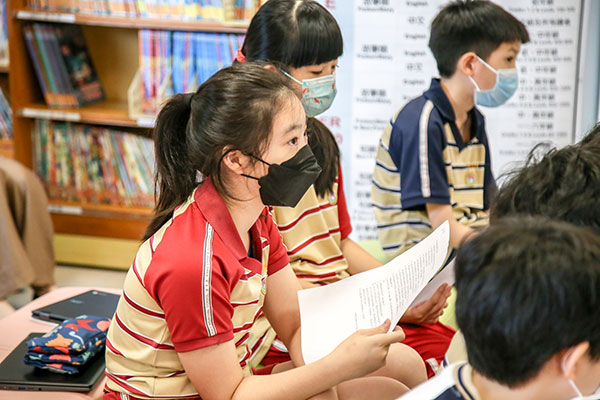
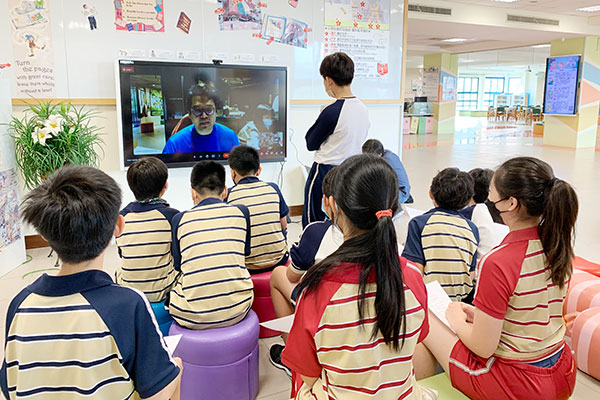
Q7: Have you ever thought about giving up running the foundation? If you have, why? If not, what makes you persist in running the foundation? (Jayden Liu)
I only founded this foundation 2 years ago; I haven’t thought of the idea of giving it up yet, but I know that the foundation gives me a lot of power. It is just like how you go to school and learn every day, but sometimes your parents will take you on a trip, and then afterwards you will have more energy to learn and do work. Working and learning are the same too; when your school teachers are teaching you, some may think that you are naughty or poorly behaved, and they may feel very angry. They might try to change their way of thinking, by doing other things, so they will have more energy. Me too. My job is helping people to deliver babies, and attending to their needs. And I do the same thing every day, so I will feel tired too. People sometimes don't want to work, just like you don’t want to go to school. The foundation gives me another way of seeing things. When I feel tired, I will leave for three days and go to Hualian and Taitung to do some public welfare activities. Then I will see that there are some people in society who are happy because of my help, and they will feel happy because I help them, or do things with them. Knowing the things I do are helping many people gives me a sense of accomplishment. It will make me feel happy when I go back to work, too. So I haven’t thought of giving up. I just feel happy, too. (Dr. Lin nods his head)
Q8: What’s your attitude and approach towards the foundation? (Antony Pan)
Ideas and attitudes are taken from society, and used in society, which means that they hope to help some people in society who wish to be helped. Yes, the concept is probably that simple. Yes.
Q10: How do you help anxious and nervous women during pregnancy? Do you help all pregnant women, or only those with special conditions? (Ting-En Liao)
Pregnancy is actually a lot of pressure for the pregnant mothers, so the main thing I do is tell them jokes. A pregnant mother can't see the child in her womb, so she will worry about whether her baby is healthy or not, and whether the baby can successfully grow up. They’ll worry. So as doctors, we will use ultrasound to examine the baby’s anatomy and condition. We will then explain what we see to the mothers and let them know that nothing is wrong, and there are no problems. Only by repeating this they will understand, because when they are pregnant they are very sensitive. Just like when your mom wants to teach you something, she needs to keep saying the same thing over and over again, and if you don’t understand, then she will say it even more times over so that you understand. It is the same with us.
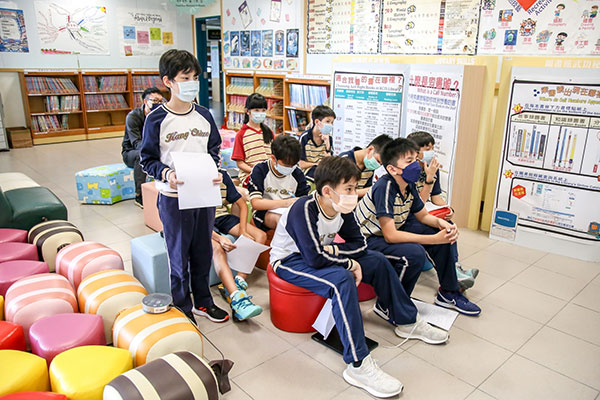
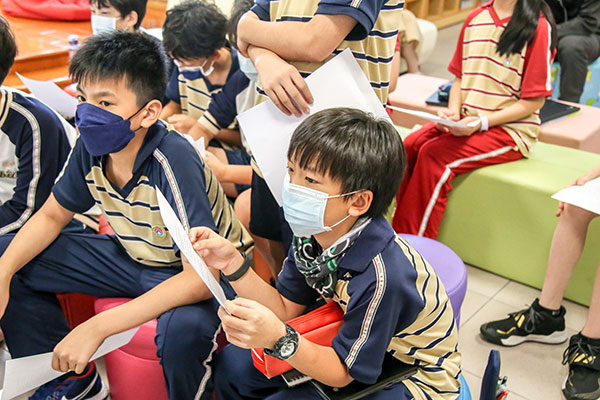
Q11: How do you help women and their newborns with rare diseases? What will you do if the diagnosed rare diseases can’t be cured, or if they require a large amount of further funds for operations? (Ting-En Liao)
When the baby is still in the womb, um… the dads and moms actually have a choice. If there is really a disease, and it is serious, some moms will choose not to give birth to the child. But when they choose to do so, in fact, they are really really sad. It is just like if you have a pet, and you know that it won’t be able to live very long, you will be very painful when you give up its life. You will cry and be very sad; so will the mothers if they are giving up their babies. Therefore, we need to tell the mothers what will happen to the baby after it is born, and what problems it will face, so that the parents can decide whether to give up this child or to keep it. But if the child is already born, there is no other choice: you can’t give up the baby. So when the baby is born, it needs the right doctors and the right treatment. If parents are told that the treatment requires a large amount of money, what can they do? There are two ways. First, there are now health insurance plans that are specifically designed for this type of situation and can um… help them save money and help these children. The second thing is that if it’s really expensive, and can’t be covered by the health insurance, a “rare disease fund” will provide some special support, and part of the money to afford these medical costs. The parents will need to contact the “rare disease fund” for this service.
Q12: Have you thought about how you can keep the spirit of the foundation alive, when you grow old and retire? (Joanne Lo)
I have not thought about this question yet, haha. When I turn into an old grandpa, you are going to be like my age now. When you grow up, your work and abilities become better. You can keep this idea in your mind, and when you earn money by yourself and have your own child and family, you can help a foundation for a long time. It does not have to be our charity, there are many charities in our society that do good things. If everyone has enough resources, you can help. For instance, you can donate part of your allowance, or part of the salary that you will have in the future. These charities can do their work because of your help, and pass on your kindness. Right.
Q13: Aside from any regrets while practicing medicine, are there other reasons why you wanted to establish the foundation? (Joanne Lo)
Dr. Lin: Em, our work is really tiring, and all the maternity care patients will want to have care around the clock, but our scheduled clinical time is just so short, only 5 or 10 minutes. The time for us to help is very limited. But you see, your teacher and I know each other because I started this charity. When your teacher thinks you can all learn something from this charity, which is why we are having this interview, now you are learning how to help more people. So I think this is a great ongoing effect of the charity. Because I have this charity, I can have some follow up activities, so we can help… “Cyberfair?”
Student: CyberFair Club!
Dr. Lin: It will keep on going. When you ask questions about what we do, you have a chance to know ”What is this charity doing?” When you grow up and you are in middle school, high school, or even an adult, maybe one day you will also establish a charity of your own. Or you will want to do something that helps others.
Student: Thank you!
Dr. Lin: You're welcome.
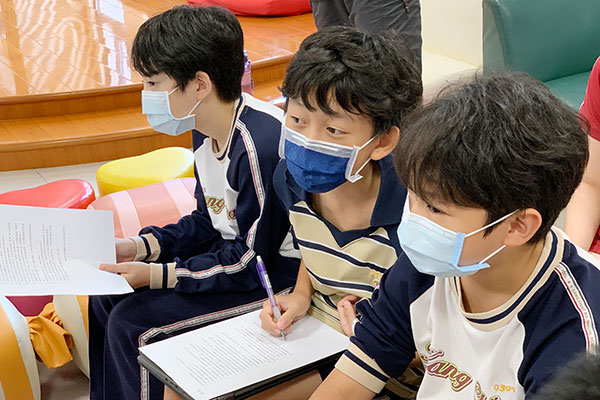
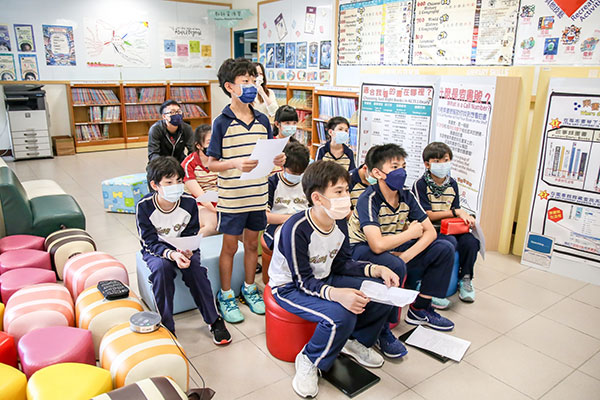
Q14: What do you do when the foundation lacks funding? (Albert Tsai)
Then I need to ask you to raise money! We have to donate money. We have that piggy bank, this one. We have a piggy bank for you to donate money and fill it up. Donate to that little pig. Someone gave us a piggy bank before. Look at his piggy bank.
Q15: How has the COVID-19 pandemic affected the foundation? (Albert Tsai)
Our foundation is doing okay, but there are still many foundations all over the world that have been affected, especially the foundations that rely on small donations, because the pandemic has made the lives of many people harder. It’s hard work, as everyone’s fundraising amounts have dropped drastically, so the resources they can allocate to everyone have become relatively small. Fortunately, it only affects some foundations. As a charity, how much we can help is determined by how many resources and how much money we have. Doing good deeds shouldn't be a burden. Relatively speaking, you have to do what you can, so it will last longer, yes.
Q16: Other than making donations and purchasing charity goods, how else can we help underprivileged groups? What’s your suggestion, if we students also want to devote ourselves to community care? (Isa Chen)
Donating money or buying charity goods of course are ways of helping. In addition, I think it is also important to do volunteer work. For example, our charity will work with rare disease charities and other charities that are holding activities. Then we really encourage these children to join us, because joining can let others have experiences with people living different lives from yours. Then your perspective will become wider, and you can learn that there are people in the society that may be outwardly different, but still are a part of society too. You should try to accept them, tolerate them, and respect them. I think volunteering is an important thing: you can get something, it will help.
Just like I said, becoming a volunteer. This is also what you can do, to let other students experience that. Then, if you are on a path like this, or if you have a classmate in your class in the future, who has some physical or mental challenges, then you have to accept them in your heart. Only their appearance may be different, or there may be some differences in their thinking. But they are your classmates, and a part of society. You should try to accept them, tolerate them, and respect them. This is the best help that you can do, so they can enter society and not just remain at home.
Q17: Are you planning on helping different groups, such as elderly people living alone? Also, does the foundation plan on helping immigrants in Taiwan? (Tiger Lin)
We are a new charity. So, we still hope to use our resources to help women, mothers, and children. How much we have determines how many things we will do. In the future, if the charity is stronger and has more support from people, of course we will move forward in more directions. We have small plans, medium plans, and long-term plans. We are still in the early phase, so we still focus on pregnant women and children. As for foreigners, this is not a focal point we have considered. However, if their children have economical difficulties, and they also need help, we will help them too. So whether foreigners or not, that is not the key point.
Q18: Does the foundation work with hospitals in Taiwan? If so, why? (Tiger Lin)
We help some children's hospitals. As I just said, we hope that children who can be treated can be helped when they are born. For example, for a child with a cleft palate, their lips will not be formed correctly, we will help them; or, like heart disease, if there is a little problem in the heart, they can be cured. We let pregnant women know if there is no problem with their babies, and that they can still give birth to the children. We give these pregnant women information, support, and help. We hope that they can give birth to the child, and not get rid of it. The second one is that we are targeting those hospitals that can get help via donations. We work with them. As I just said, regarding diseases, we will give these hospitals some assistance and some help. For people that are born with heart problems, we will help them to be at ease in the process of treatment, and not endure so much pain. So we do work together with hospitals by donating medical resources, hoping that they can have more equipment to treat these babies. So we will help these people we want to help by providing what they need, and what the hospitals need.
